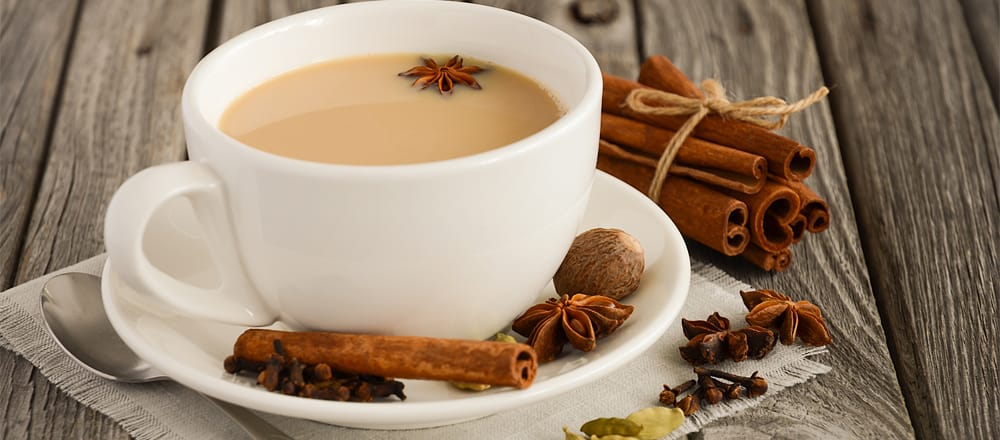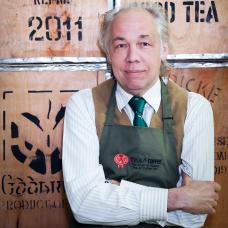How To Make Masala Tea Step by Step

You may have heard about Chai, a spicy infusion from India, but have you ever wanted to know how to make Masala Tea? The time has come for you to learn a traditional recipe so that you can try it at home.
The following article will offer just that, going into detail about what Masala Tea is before giving you straightforward step-by-step instructions. And that’s not all.
We will also determine whether it contains caffeine, if it is safe during pregnancy, and what kind of health benefits it provides upon frequent consumption.
Best of all, should you be more interested in buying ready-to-drink Chai Tea, you can count on The Kent and Sussex Tea and Coffee Company. Since our founding in 1982, we have packed all of our products fresh to order, ensuring quality and consistency.
How To Make Masala Tea Content

What is Masala Tea?
Masala Tea (“Spiced Tea” in Hindi) is a Flavoured Indian Black Tea that includes various herbs and spices. This prompts the question: “What is Masala Tea made of, exactly?” In other words, “What are Masala Tea’s ingredients?”
The most common additions are cardamom, cinnamon, cloves, peppercorn and star anise, although some varieties also have ginger root, turmeric, fennel, ginseng or nutmeg.
The reality is that Masala Tea recipes differ from region to region, village to village, and sometimes even household to household. But that doesn’t mean we can’t provide you with a baseline guide to get you started.
Once you know the simple methods required, you can consider experimenting with flavours and ingredients. So, without further ado, allow us now to show you how to make.

How to Make Masala Tea
The following how to make Masala Tea at home guide will require a Tea Strainer, a saucepan, a mortar or Coffee grinder and the ingredients listed below.
We’ve chosen Assam Tea, in particular, because it comes from the Indian state of the same name. It is as traditional as tradition can be. All that’s left, then, is to go through the steps before indulging in the finest Chai around:
Ingredients: Assam Tea, Cardamom Pods, Cinnamon, Cloves, Ginger Root, Peppercorns, Milk, Sugar (Optional), and Water.
1, Crush Spices in a Mortar or Coffee Grinder.
Put Cardamom, Cinnamon, Cloves and Peppercorns into a Mortar or Coffee Grinder and slightly crush them for inclusion in the recipe.
2, Grate the Ginger Root.
This will create a stronger flavour when brewed, get Ginger Root Tea.
3, Combine Spices and Water in a Saucepan on the Hob.
Bring the mixture to a boil. Do NOT add the Black Tea leaves yet.
4, Remove Saucepan from the Heat, Cover, and Let it Steep.
Temporarily take the saucepan off the hob, leaving the spices to infuse for around five minutes.
5, Replace Saucepan with Milk and Sugar if Wanted.
The sugar is down to personal preference. Once more, bring it to a boil.
6, Again Remove from the Heat to Add Loose Tea.
Repeat the process from before, though now including our House Assam Tea TGFOP.
7, Cover, Allow it to Steep, and Stir Thoroughly.
Three minutes of steeping time should be sufficient. You can then stir for at least 90 seconds.
8, Strain the Infusion for Serving.
Get your Tea Strainer and pour the Masala Tea into a Teapot or directly into cups.

Does Masala Tea Have Caffeine?
Every sip will offer a distinct and delicious spiciness with malty undertones, seldom ceasing to impress casual drinkers and connoisseurs alike.
But what remains to be seen is, “Does Masala Tea have caffeine?” Add the word “invigorating” into the mix as it does indeed. This is because of the Assam Tea contained within, which provides around 45-mg of the stimulant per serving.

Is Masala Tea Good for Pregnancy?
There are a few factors to consider when looking into “Is Masala Tea good for pregnancy?” For starters, according to NHS Choices, expecting mothers should limit their caffeine intake to 200-mg daily – the equivalent to four cups of Chai.
The fact that it has herbs and spices, too, should mean you’re cautious with how much you consume. If you have any concerns, please speak to a medical expert beforehand.

Is Masala Tea Good for Health Benefits?
For the vast majority of people, Black Tea Benefits, alongside those associated with other inclusions, have the potential to improve life in small yet significant ways.
Assam Tea alone has been associated with enhanced cognitive function, improved oral health, and reduced anxiety. Throw the likes of Ginger Root and Cinnamon into the mix, and you’ll find that Masala Tea for weight loss is also a good idea.
Is Masala Tea good for coughs and colds as well? You can count on it. This is due to its high levels of Vitamin C, which, as many of us will know already, is an immune system booster.
Then there are Peppercorns capable of supporting the pancreas in secreting digestive enzymes. Then there are the anti-inflammatory properties of Cloves that ease aches and pains. The possibilities are endless.
Summary to How to Make Masala Tea
Does our guide seem like too much hassle? There is an alternative in buying ready-blended Chai Tea at The Kent and Sussex Tea and Coffee Company.
If convenience is key, be sure to choose Bombay Tea Chai Tea Bags. Should you prefer Loose Leaf varieties, options include Masala Chai, Madagascan Vanilla Chai Tea, or caffeine-free Rooibos Masala Chai Tea.

 Loose Leaf Tea
Loose Leaf Tea Pyramids
Pyramids Tea Bags
Tea Bags Africa
Africa Assam
Assam Ceylon
Ceylon Chinese
Chinese Darjeeling
Darjeeling European
European Indian
Indian Japan
Japan Nepal
Nepal South East Asia
South East Asia Ayurveda Tea
Ayurveda Tea Black Tea
Black Tea Chai Tea
Chai Tea Flowering Tea
Flowering Tea Fruit Tisanes
Fruit Tisanes Green Tea
Green Tea Herbal Tea
Herbal Tea Matcha Tea
Matcha Tea Oolong Tea
Oolong Tea Organic Tea
Organic Tea Pu erh Tea
Pu erh Tea Rooibos Tea
Rooibos Tea White Tea
White Tea Asian Coffee
Asian Coffee Caribbean Coffee
Caribbean Coffee Central American Coffee
Central American Coffee South American Coffee
South American Coffee Coffee Blends
Coffee Blends Decaffeinated Coffee
Decaffeinated Coffee Espresso Coffee
Espresso Coffee Ethically Sourced Coffee
Ethically Sourced Coffee Flavoured Coffee
Flavoured Coffee Organic Coffee
Organic Coffee Single Origin Coffee
Single Origin Coffee Chocolate 1
Chocolate 1 Chocolate 2
Chocolate 2 Chocolate 3
Chocolate 3 Chocolate 4
Chocolate 4 Chocolate 5
Chocolate 5 Chocolate 6
Chocolate 6 Chocolate 7
Chocolate 7 Chocolate 8
Chocolate 8 Chocolate 9
Chocolate 9 Loose Tea Filters
Loose Tea Filters Tea Accessories
Tea Accessories Tea Bricks
Tea Bricks Tea Caddies
Tea Caddies Tea Caddy Spoons
Tea Caddy Spoons Tea Gift Ideas
Tea Gift Ideas Tea Infusers
Tea Infusers Tea Strainers
Tea Strainers